Why Football - All Sports- Should Not be Compared to “War”





 Email to a friend
Permalink
Email to a friend
Permalink
Thursday, July 23, 2015
Hank Stern, GoLocalPDX Contributor
At long last for football fans, the 2015 season looms in sight with both the start of NFL camps and Pac-12 Media Day upcoming in the days ahead.
But as we ready for the fantastic six-month glut of college and pro football through January, there’s one tradition that needs to go the way of the straight-on field goal kicker. That is, the ridiculous comparisons that players and coaches make between football and war.
You know the quotes from the blow-dried millionaire college coach who equates with no trace of shame his school’s rivalry to “war,” or from an equally well-compensated All-Pro linebacker who brags before a game that he and his teammates are like “soldiers getting ready for battle.”
Football is many things. It is an incredibly violent game. Its players risk life-altering injuries -- concussions, ripped ligaments, torn muscles and grotesque fractures. And yes in some cases, players die.
But let’s not cheapen the sacrifices of servicemen and servicewomen by likening a game with rules, referees and riches to war, which can send its participants home in wheelchairs and/or brain injuries and nightmares for a lifetime.
At some level, it’s no wonder football players and coaches fall back on such embarrassing combat clichés to describe what they do, even as teams often honor actual veterans at games. Football demands courage and physical sacrifice.
And sports reporters don’t help with their description of NFL draft-day operations as “war rooms” or players as “warriors.”
The late and much-missed comedian George Carlin captured how football lingo lapses into battle banalities with his brilliant football-vs.-baseball routine in which he describes football where “the field general launches an aerial assault riddling the defense in spite of the blitz using the shotgun with short bullet passes and long bombs as he marches his troops into enemy territory balanced with a sustained ground attack punching holes in the enemy’s defensive line.”
To be fair, football does not have a monopoly in its participants somehow inflating their lives in some ways to those of soldiers.
Such idiocy happens in every sport, as evidenced by Damian Lillard’s recent rap release of “Soldier in the Game.”
I don’t pretend to know about Lillard’s life growing up in Oakland or all that he overcame to star in the NBA.
But here’s what I do know about one of my all-time favorite Trail Blazers: He is a two-time All-Star whose shaky playoff series against Memphis made fans forget too soon that he hit the winning shot in Game 6 of the first round the year before against Houston to vault the Blazers into the second round for the first time in more than a decade.
He is now the undisputed face of this franchise, having just signed a five-year, $120 million deal.
Lillard is all of the above and he seems like a decent guy. However, he is not a soldier.
But I digress. Lillard’s rap is a one-off whereas the larger foot-in-mouth disease of athletes and coaches transforming themselves into warriors is most prevalent in football.
For those who can’t discern the difference between a brutal sport and war, it boils down to this: athletes choose to play a violent sport in exchange for fame and fortune. Servicemen and servicewomen must follow orders into battle in exchange for the constant threat of death and dismemberment.
Let’s all try to remember the distinction this football season.
A native Oregonian, Hank Stern had a 24-year career in journalism, working for more than a decade as a reporter with The Associated Press in Oregon, New Jersey and Washington, DC. He worked seven years for The Oregonian as a reporter in east Multnomah County, Washington County and Portland’s City Hall. In 2005, he became Willamette Week’s managing news editor and worked there until 2011.
Related Slideshow: Slideshow: Ten Injuries That Could Have Cost The Ducks and Bucks Their Season
Here are 10 injuries that could have cost the Ducks and Buckeyes their season:
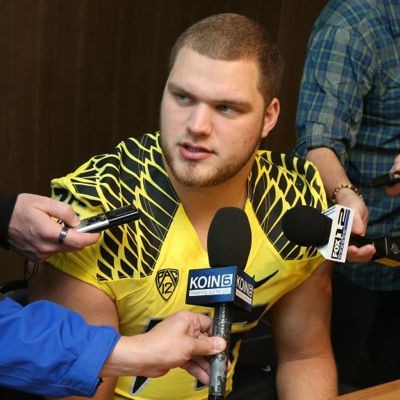
Prev
Next
Oregon Ducks
Tackle Jake Fisher
Jake Fisher has been a three-year-starter on the Ducks’ offensive line. He plays left tackle - a position often reserved for a team’s best pass-blocker (if a defender were to tee-off on a quarterback’s blind side, the result could be season-ending).
The AP All-American went down in September against Wyoming, and quickly proved how important he was to the Ducks’ success. In two games without Fisher, Mariota was sacked twelve times and the Ducks lost a home game against Arizona. When Fisher returned to the lineup against UCLA, Mariota was not sacked.
Fisher is projected to be a first-round-pick in the NFL draft in May.
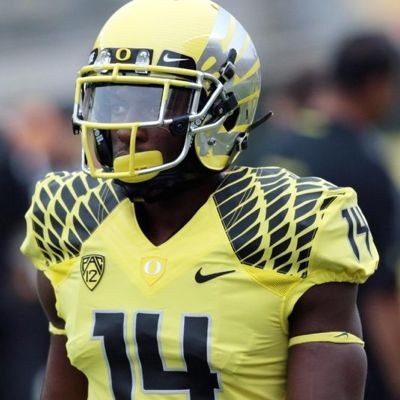
Prev
Next
Oregon Ducks
Cornerback Ifo Ekpre-Olomu
Ifo Ekpre-Olomu went down with a season-ending injury during one of the Ducks’ December practices.
Having an All-American taken out of your defensive secondary, especially before facing-off against a pocket-passer like Jameis Winston, can be enough to end a playoff run.
However, losing Ekpre-Olomu was a non-issue for the Ducks. Although Winston passed for more yards than Mariota in the Rose Bowl (Winston threw for 348 vs. Mariota’s 338), Winston scored only one passing touchdown.
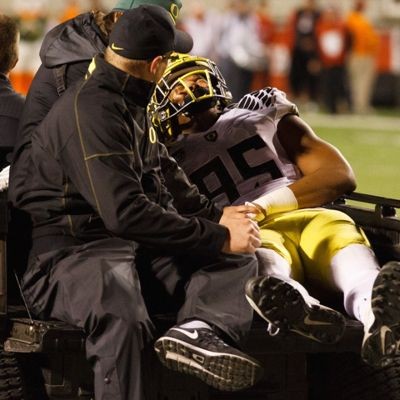
Prev
Next
Oregon Ducks
Tight End Pharaoh Brown
Pharaoh Brown went down with a season-ending knee injury during the Ducks’ 51-27 win at Utah Nov. 8.
The injury was so severe enough to threaten Brown’s career. It was so violent, in fact, that ESPN refused to replay the injury during its broadcast of the game.
A tight end is an important outlet for any QB. At the time of his injury, Brown has 25 receptions, while his replacements had only registered a total of three receptions.
The loss of Brown was not a setback for Mariota, who became the first QB in school history to register 50 more touchdowns than turnovers in a season (56 TDs to 6 turnovers).
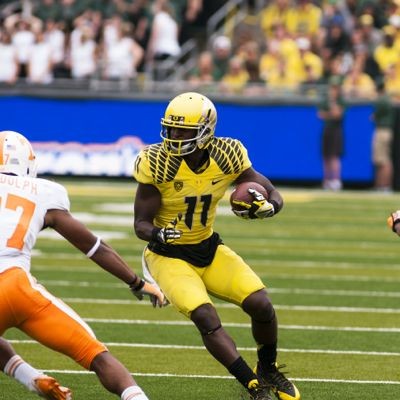
Prev
Next
Oregon Ducks
Receiver Bralon Addison
Bralon Addison went down with a season-ending injury in August after being the team’s second leading receiver in 2013. He was the Ducks’ “taser,” a Chip Kellyism that refers to a speedy player who lines up in the slot as well as in the backfield.
In a way, Addison’s injury left the Ducks without two players: a wide receiver and a backup running back.
The Ducks' receivers, along with a group of young running backs, stepped up in Addison's absence.
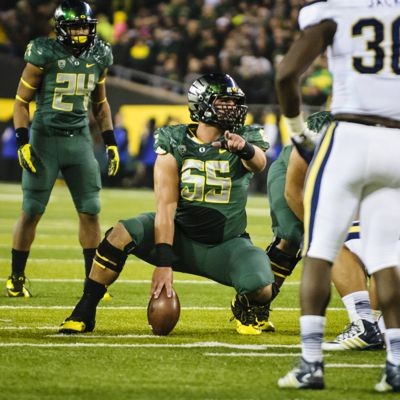
Prev
Next
Oregon Ducks
Center Hroniss Grasu
Like Brown, Oregon Center Hronnis Grasu also went down with a leg injury during the Ducks’ Nov. 8 game at Utah. Losing a center would be a big loss for any team - the center is often referred to as “the quarterback of the offensive line,” because he’s the one tasked with making most of the line’s pre snap reads and calls.
The injury forced the Ducks to move a guard over to play center, and have a number of guards play musical chairs in the then-vacated guard spot.
Coaches voted Grasu to the First Team All Pac-12 list for the thirst consecutive year.
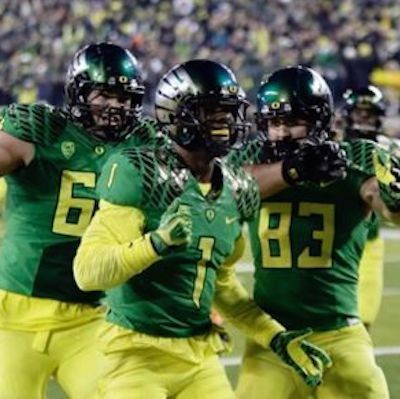
Prev
Next
Oregon Ducks
Tackle Tyler Johnstone
An All-American as a junior, Johnstone started 26 games for the Ducks before suffering a knee injury in the Alamo Bowl in December 2013. Prior the start of the 2014 season, Johnstone injured his knee again, requiring season-ending surgery.
The Ducks its most-consistent pass blocker when Johnstone went down. If he had remained healthy, there’s no doubt that the Ducks could have avoided their mid-season disasters on the o-line.
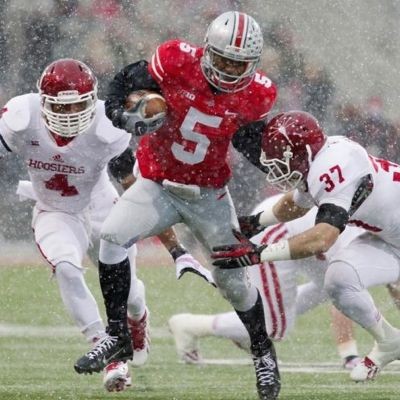
Prev
Next
Ohio State Buckeyes
Quarterback Braxton Miller
After being voted First Team All Big-10 for two consecutive seasons, Miller went down with a season-ending injury in August.
Losing your quarterback is never an easy obstacle for any coach to overcome.
Urban Meyer, however, had a contingency plan. His Bucks went on to have an impressive season on its way to the first-ever College Football Playoff.
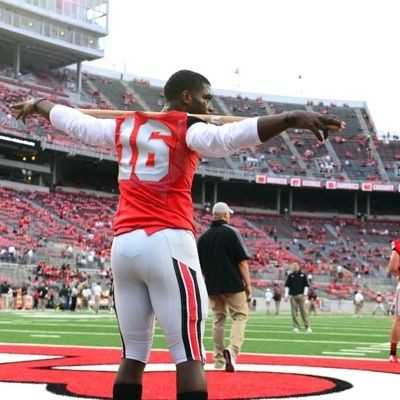
Prev
Next
Ohio State Buckeyes
Quarterback J.T. Barrett
When Quarterback Braxton Miller went down, J.T. Barrett stepped in. Despite a loss against Virginia Tech and an overtime scare against hated Penn State, Barrett was able to put himself in Heisman contention.
Barrett passed for over 2,800 yard while rushing for 938 before injuring his ankle in the Michigan game.
Third-string QB Cardale Jones, a third-year sophomore, stepped in for Barrett when he went down late in the year and preserved the Buckeye’s season - including the Bucks' Jan. 1 upset win against Alabama in the College Football Playoff semifinals.
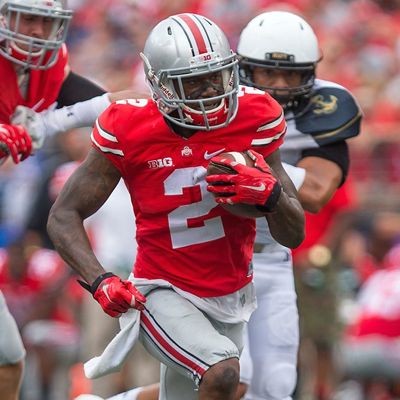
Prev
Next
Ohio State Buckeyes
H-Back Dontre Wilson
Dontre Wilson went down with a foot injury that required season-ending surgery. The heralded running back had contributed more as a blocker and receiver than as a rusher - he had 21 catches for 300 yards before he went down Nov. 8 against Michigan State.
His impact as a blocker was huge - although difficult to measure. The Buckeye offense didn't miss a beat - Ezekiel Elliot still rushed for over 200 yards against the Alabama defense.
When playing with backup QBs, even losing one check-down option is a huge blow.
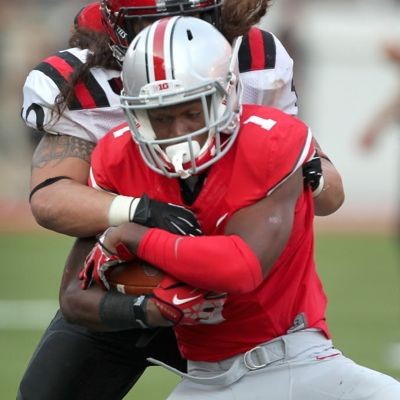
Prev
Next
Ohio State Buckeyes
Wide Receiver Johnny Dixon
Freshman receiver Johnny Dixon, a Florida-native, was a four star recruit coming out of high school. With an inexperienced receiving corps, fans expected Dixon to find his way into the rotation later in the year, hopefully prove to be a big play maker.
With losing their first two QBs, we’ll never know how big of a year Dixon could have had for the Bucks had he stayed healthy.
Enjoy this post? Share it with others.





 Email to a friend
Permalink
Email to a friend
Permalink
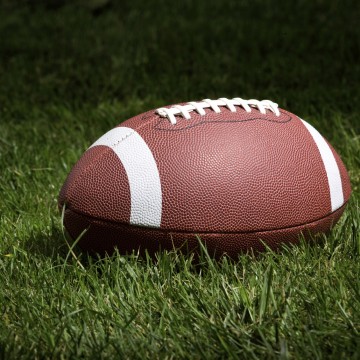


























Follow us on Pinterest Google + Facebook Twitter See It Read It